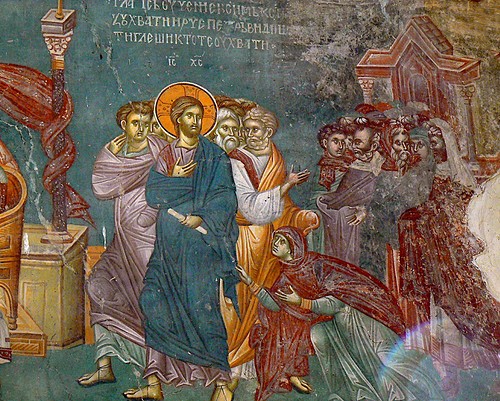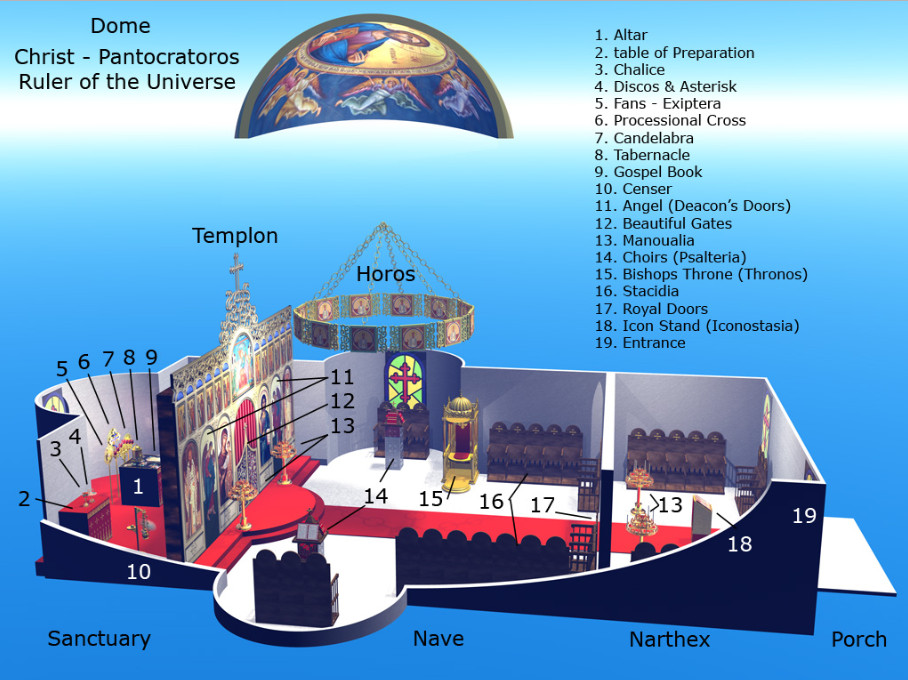|
|
Orthodox Outlet for Dogmatic Enquiries | Orthodox Practices |
|
MENSTRUATION AND CHURCH
By Fr. Panagiotis Vardouniotis
Source:
http://euxh.gr |
|
Many Christians – especially Christian women – are ecclesiastically
concerned about the matter of menstruation.
And their queries are various:
Can women (during their menstrual period) enter the church?
Can they venerate the icons? Can they receive the Antidoron?
Can they participate in divine worship? Can they go to confession
and receive the Body and Blood of Christ?
We shall attempt to shed light on this topic, from within the
Canons of the Church and the teachings of the holy Apostles and Fathers.
Let us firstly take a look at the 2nd Canon by Saint
Dionysios of Alexandria, which is the only Canon that focuses
specifically on the matter and is also included in the “Pedalion” (The
Rudder).
It says in the Pedalion: “Being
questioned as to whether women during their menstrual period can enter
the temple of God, the saint replied that there was no need for that
question to be posed at all, because if those women possess the
appropriate piety for divine things, they will
of their own accord
not dare to approach the Holy Altar and receive the Body and Blood of
Christ while still in the state of menstruation.
Because they should bring to mind that hemorrhaging woman in the
Gospel, who,
out of excessive piety did not dare to touch Christ’s body
(to be healed) and touched only the hem of His garment. They can,
however, either pray at home, or when they are in the Narthex
(vestibule) of the Temple beseeching God, asking for help and salvation
from Him. One is, however,
hindered from approaching the Holy of Holies – that is, the partaking of
the Body and the Blood of Christ – if that person is unclean in soul and
in body, just as unclean
in body
is the woman who is in the state of menstruation”.
(Pedalion,
p.445-446).
Let us see what Saint Dionysios says, in order to understand what the
spirit – not the verbatim wording – of the Canon says.
The first thing that we all can understand is that this Canon
tells us that women who are in their monthly period cannot partake of
the Body and the Blood of Christ – because of a personal sense of piety
(the word piety is repeated twice) and NOT because of sin or spiritual
uncleanliness.
Menstruation is a natural state of cleansing in a woman’s body; thus,
being a natural state, it is not an evil thing per se.
The Apostolic Commands in the 6th book state:
“Neither sexual intercourse within a legal marriage, nor the
(post-natal) state of puerperium, or the woman’s flow of blood, or the
man’s involuntary ejaculation during sleep can defile human nature or
isolate it from the Grace of the Holy Spirit, except
only impiety and an illicit act”.
In his work “Regarding incarnation”, Saint Athanasius writes:
“For He did not come to
remove nature, but to correct predisposition.”
The Son did not become incarnate in order to abolish human nature –
which is not responsible for the Fall – but was incarnated in order to
repair man's free will, since that was responsible for the Fall into
sin.
In his work “Precise edition of the Orthodox Faith”, Saint John of
Damascus writes:
“So, then, God created man as a sinless nature and a self-governing
will. I consider him
sinless, not because he is not susceptible to sin (only the divine is
not susceptible to sin), but because the inclination towards sin is not
in his nature, whereas he does have it naturally, in his predisposition
– in his free will”.
In his work, where he makes reference to menstruation, the blessed
Chrysostom says:
These things are not an actual sin, nor uncleanness”.
Saint Theodoretus writes:
“Nor are the things that occur in a natural manner unclean”.
Saint Diodorus also says:
“Nothing
is unclean, except a wicked disposition”.
To the Apostles and the Fathers it is absolutely clear that
sin and spiritual uncleanness pertain to one’s predisposition and not
his nature.
Thus the menstrual bleeding, which is a natural function of the woman's
body, is neither a sin, nor something dirty.
It is (probably excessively) referred to as bodily waste, when
compared to other natural secretions such as nose mucus, ear wax, gummy
eyes, spittle, urine and feces.
Thus - solely as her own pious gesture - a menstruating
woman will not partake of the Sacrament of the Holy Eucharist. For
example, one does not go and receive Holy Communion with a runny nose;
he must previously have cleaned that part of his body, around his nose
and mouth, before approaching the holy Chalice; likewise, a menstruating
woman will wait until she no longer has any menstrual flow before
approaching to receive the Body and the Blood of Christ.
Unless there is a serious illness and danger of death, in which
case she will receive Holy Communion albeit menstruating, as Saint
Nicodemus elaborates in the footnotes of Saint Dionysios’ Canon.
There is a sentence in this Canon of Saint Dionysios, which has caused
confusion to many. Says
Saint Dionysios:
The words ‘Narthex of the Temple’ causes many to believe that women who
are menstruating cannot enter the Nave and participate in divine
worship. Let us examine the meaning of ‘praying in the Narthex’.
In Saint Dionysios’ time – 3rd century AD – common
worship is mentioned only in relation to the congregating of the
faithful, that is, the function of the Divine Liturgy.
The Divine Liturgy is divided into 2 parts.
First is the theological part, which begins with the reciting of
the words ‘Blessed is the kingdom of the Father and of the Son and of
the Holy Spirit…” and ends with the reading from the Gospel and the
sermon on the divine words. (The place of the sermon is directly after
the reading of the Gospel). Following the sermon, the Deacon announces:
‘Go forth, all those who are being catechized; let the catechized ones
go forth; let there be no-one of the catechized. To those who are
faithful, let us all pray to the Lord, again and again’.”
In other words, the Deacon instructs those present as follows: “Those
who are in the ranks of the catechized – the unbaptized, that is –
should depart from the Nave and go back to the Narthex; no unbaptized
person can remain in the Nave and participate in the second part of the
Divine Liturgy and receive the Body and the Blood of Christ.”
After all of the unbaptized have departed from the Nave, the Deacon
says: “So, now that we who have remained are the baptized ones, let us
pray to the Lord, over and over….”
Then he says: “The doors!
The doors! Let us be
wisely attentive!” The
interpretation of the tangible aspect of this statement is: “Close the
doors well, so that none of those who is not permitted can enter the
second part of the Divine Liturgy”, while the interpretation of the
spiritual aspect is: “Let us
close the doors of the senses and perform the bloodless worship within
our hearts “.
Now - along with the unbaptized - those who also had to leave the Nave
and stand in the Narthex were the baptized ones who had fallen into sins
that were prohibitive to the communing of the Body and Blood of Christ.
These were the ranks of the “weeping supplicants” because they
would beseech God with tears, and there were those who remained for the
Divine Liturgy, in order to pray for them, that God may forgive them.
It is at this point that the second part of the Divine Liturgy begins:
the theurgic part, in which everyone who remains in the Nave can
participate in the Holy Communion.
Only those who were going to receive Holy Communion could stay
for the Divine Liturgy.
Now we can understand why Saint Dionysios mentions that menstruating
women can pray – in the Narthex. It is because those women
did not intend to receive Holy Communion
and therefore had no reason to remain in the Nave during the theurgic
part of the Divine Liturgy.
As stipulated in the 9th
Apostolic Canon, only those who are going to receive Holy Communion can
stay inside the Nave for the Divine Liturgy – in fact,
the specific Canon actually
EXCOMMUNICATES any faithful (who is not otherwise
barred), if that person DOES NOT stay for the Divine Liturgy and commune
the Holy Mysteries!
In conclusion, we could say that the woman who is in her menstrual phase
can participate in all other ecclesiastic matters, except in the
partaking of the Body and Blood of Christ, given that Saint Dionysios is
very clear about this:
“…if those women possess the appropriate piety for divine matters,
they will, of their own accord, not dare to approach the Holy Altar and
receive the Body and Blood of Christ while still in the state of
menstruation. Because they
should bring to mind that hemorrhaging woman in the Gospel, who, out of
excessive piety did not dare to touch Christ’s body (to be healed) and
touched only the hem of His garment..” - NOT because those
women are spiritually unworthy, but out of conscientious piety.
Because even Saint Dionysios notes at the end of the Canon that no-one –
man or woman – can participate in the communion of Christ’s Body and
Blood, if they are unclean in soul or in body….
Translation by A.N. |


